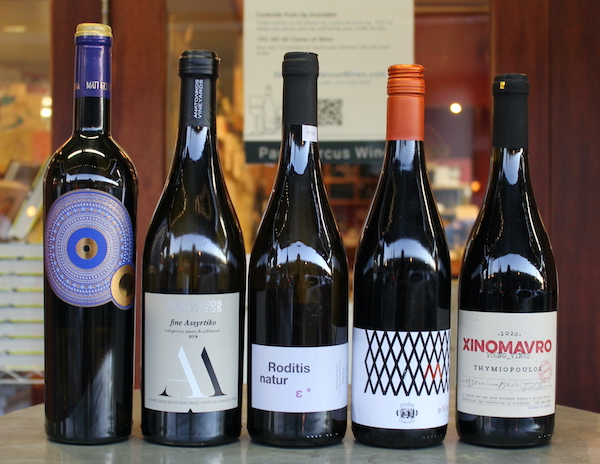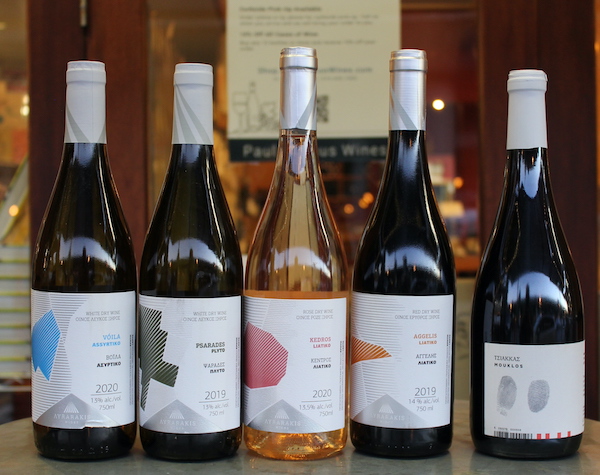Homer, by my count, mentions wine at least 87 times in The Odyssey–and that’s not including “the wine-dark sea,” his oft-repeated epithet for the Mediterranean. Oh, what I would give to have been invited into Odysseus’s wine cellar:
And there, standing in close ranks against the wall,
Were jars of seasoned, mellow wine, holding the drink
Unmixed inside them, fit for a god, waiting the day
Odysseus, worn by hardship, might come home again.
Despite thousands of years of important wine history, Greek wine in the 20th century had descended into an abyss of too rustic, often oxidized regular wines, and cheap, pine-resin-infused retsina. That all began to change in the 1980s, and today there’s a plethora of exciting wines made from an ample range of characterful indigenous grapes grown in often-mountainous terroirs on both the mainland and the islands. At Paul Marcus Wines, we’re excited to feature a number of Greece’s most notable current producers.

2019 Inomessiniaki Moschofilero Mati Fortuna
Moschofilero is an aromatic white variety, similar to yellow muscat. This one comes from scenic Peloponnese–the large peninsula just west of Athens. Floral and herbal aromas leap out of the glass, and yet the wine is bone dry on the palate. “A garden in a glass,” you might say. If that sounds like fun to you, try it as an aperitif or with fragrant Vietnamese and Burmese dishes.
2018 Anatolikos Vineyards Fine Assyrtiko
The island of Santorini has long championed assyrtiko, and there’s no question that this impressive variety is capable of making complex, mineral, salty whites. This example, however, is from the northeastern mainland, specifically Western Thrace, and it’s an organically farmed blend of assyrtiko (90 percent) with a bit of malagousia. This is a bigger-boned and more complex assyrtiko, but it retains the grape’s trademark acidity and minerality. Think octopus (Greek for “eight-footed,” of course), tomatoes, and anchovy pizza.
2020 Markou Vineyards eMeis Red
This light, fresh, spicy red from the Peloponnese is agiorgitiko (a.k.a. St. George, Greece’s most widely planted red variety) and mandalaria farmed organically and fermented with 100 percent carbonic maceration–in the style of many a Beaujolais. It begs for a light chill and perhaps some sausages or even grilled fish.
2019 Tetramythos Mavro Kalavrytino Natur
Here’s another fresh red from the Peloponnese, from the rare, über-local variety mavro kalavrytino. It’s darker-fruited and a little more earthy than the preceding, but still light on its feet and low in tannin. Farming is certified organic, and the grapes are foot-tread. Try it with mushroom dishes or truffled cheeses.
2020 Thymiopoulos Naoussa Xinomavro Young Vines
Naoussa is a wine appellation in the northern Greek region of Macedonia (not to be confused with the Republic of Macedonia, the country right across the border). Xinomavro, often compared to Italy’s nebbiolo, is the star grape in Naoussa. Thymiopoulos’s organically and biodynamically farmed young-vine version is akin to an easygoing Langhe nebbiolo: fresh, with moderate tannins and aromas of olive, spice, and underbrush. Give it a go with tapenade or lamb.

Crete is the southernmost Greek island and the largest producer of wine in the Aegean Sea. We recently brought on four new wines from the Lyrarakis family. They founded their winery in 1966 and now work with 100 small, independent growers all over the island (in addition to farming their own vineyards). Their focus is on indigenous varieties, and they are intent on improving both farming and vinification throughout Crete.
2020 Lyrarakis Assyrtiko Vóila
Made from 100 percent assyrtiko grown at 580 meters in the Vóila area of eastern Crete, this stony, herbal, lemony, and lean wine undergoes 16 hours of skin contact. Drink it with creatures of the sea or fresh cheeses.
2019 Lyrarakis Plytó Psarades
Plytó is an indigenous variety that was saved from extinction by the Lyrarakis family in the early 1990s, when they planted it in the family’s “Psarades” vineyard (at 480 meters altitude in central Crete). Plytó makes a fresh, citrus, and mineral white wine with an herbal tinge. Dolmas, pesto, and sole piccata would be worthy complements.
2020 Lyrarakis Liatiko Kedros Rosé
This direct press rosé is made from the indigenous red variety liatiko, the most widely planted grape on the island of Crete. These grapes come from ungrafted vines planted over a hundred years ago on Mount Kedros in eastern Crete, at an elevation of 850 meters. Think of it as Provençal rosé, but with brambly fruit and a saltier finish. A consummate aperitif wine, it’s also great with meze/tapas and just about anything else on a sunny day. (Our meager allotment is running low, so this is one to jump on now.)
2019 Lyrarakis Liatiko Aggelis
From the Aggelis vineyard in eastern Crete, this red wine is 100 percent liatiko, from ungrafted vines planted in the 1930s. As a red wine, liatiko tends to be lightly colored, with floral and spicy notes. You’ll find black pepper, smoke, and stones, along with a little tannic kick. How about spanakopita, falafel, spiced meatballs, or kebabs?
We’ll finish our tour not in Greece, but in the Republic of Cyprus, an island nation south of Turkey and west of Syria with a long cultural and political (and contentious) connection to both Greece and Turkey.
2020 Tsiakkas Mouklos Mavro Red
This lively, pale-colored wine comes from the Tsiakkas family, whose winery is located near Cyprus’s Mount Olympos. Mavro ambelissimo is the variety, and Mouklos is the vineyard–north-facing at 920 meters altitude. The grapes, farmed organically, come from 80-year-old, ungrafted, bush-trained vines in sandy, volcanic soil. The indigenous fermentation (80 percent whole clusters) and 35 days of (gentle) maceration all take place in stainless steel. Delicately floral and herbal, with great acidity, this is for lovers of gamay, poulsard, schiava, pelaverga, and the like. Chill it a bit, and then enjoy it with charcuterie, moussaka, pork, or lamb.

Leave a Reply
Want to join the discussion?Feel free to contribute!